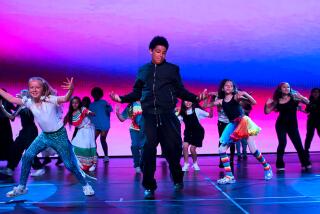Students, Parents Get Lesson in Self-Esteem
- Share via
“Put him in a home.”
Dee and Sally Butcher got that advice from well-meaning friends when they discovered that their son Dennis was mentally retarded.
Edith Ullman heard it too when her son Marc was diagnosed as autistic.
“Most of the parents here heard that,” Ullman says as she watches Marc square-dance with the Hope University/Unico National College Discovery Twirlers.
Now that they’ve seen their handicapped children into adulthood, Ullman and the Butchers have some advice of their own for parents in similar situations:
Move to Orange County.
“We came here in ’74 from Las Vegas because there was so much more for Dennis here,” says Sally Butcher. “When we found out about this school, we were so impressed. We wondered if we could get him in.”
Dennis, also one of the Discovery Twirlers, already is a part-time student. He will be one of the contestants at the college’s “Star Search” on Sunday, singing “Ability,” a song about being handicapped. He and his parents hope he can soon attend full time.
Ullman says she is moving here from West Los Angeles so that she and Marc can be closer to the school.
“This place has done a world of good to my son,” she says. “It’s really bringing him out. He’s never happier than when he’s dancing. It gives him a feeling of self-worth.”
But Marc isn’t the only one in the family who has benefited, she says. “This is good for the parents’ self-esteem too. We have such a sense of pride. It’s hard to understand unless you’ve gone through it,” Ullman says. “There are so many things the parents of more normal children take for granted. For us, each step forward is a reason for celebration.
“It helps them to be around other people like them, and it helps us too. We’re all like an extended family. And every one of us takes almost as much pride in the other one’s kids as we do with our own.
“With a lot of other people, there’s always this air of ‘what did you do wrong?’ to get a kid like this, you know? It’s hard to take.”
Sally Acton, mother of full-time student Cathy, says she’s seen “a lot of difference” in her daughter as a result of the college. “She’s easier to get along with now. She wasn’t very happy with the job she had, and she loves to perform. They didn’t call her Sarah Bernhardt at her high school for nothing.”
Cathy hovers over her mother when she’s being talked about. “Now don’t say anything derogatory,” she warns. “I have my image to maintain.”
Lou Enderson, whose daughter Linda also will be a contestant Sunday, had no choice but to put her twin sons in a home because their retardation was so severe. But Linda, three years older (she’s 38 now), was able to stay home.
All three, like Cathy Acton and many of the students at Hope, suffer from phenylketonuria, or PKU, a form of retardation caused by a reaction to the common amino acid phenylalinine. PKU tests are now mandatory at birth, and if the disorder is detected, brain damage can be prevented with a special diet.
“Linda works up to her capacity, I think,” Lou Enderson says. “But she doesn’t know things like the days of the week. You can ask her, ‘What do you do on Saturdays?’ and she’ll tell you, but she doesn’t know when Saturday is. I hope if she can get in here, she might go farther.
“But she’s still learning. She worked the microwave today for the first time, all by herself.”
More to Read
Sign up for Essential California
The most important California stories and recommendations in your inbox every morning.
You may occasionally receive promotional content from the Los Angeles Times.










